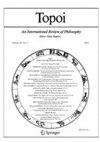孤独的地方和孤独的人
IF 1.3
2区 哲学
0 PHILOSOPHY
引用次数: 1
摘要
感到孤独,成为一个孤独的人,经历孤独的时代,都可以用个人的情感体验来解释。然而,我们也谈论孤独的地方。有时候,一个地方让我们感到孤独,即使我们自己并不感到孤独。在其他情况下,寻找一个孤独的地方也意味着感到孤独、孤立和迷失。在这篇论文中,我通过解决什么是体验孤独的地方来反思孤独的现象学结构。我认为,以这种方式接近孤独可以帮助我们看到,它不仅仅涉及缺乏或缺少某些东西,更具体地说,是一种无法接近社会和个人可能性的感觉,而这些可能性对其他人来说似乎仍然是可以接近的。本文章由计算机程序翻译,如有差异,请以英文原文为准。
Lonely Places and Lonely People
Abstract Feeling lonely, being a lonely person, and living through lonely times can all be construed in terms of the emotional experiences of individuals. However, we also speak of lonely places. Sometimes, a place strikes us as lonely even when we do not feel lonely ourselves. On other occasions, finding a place lonely also involves feeling lonely, isolated, and lost. In this paper, I reflect on the phenomenological structure of loneliness by addressing what it is to experience a place as lonely. I suggest that approaching loneliness in this way can help us to see how it involves not merely the lack or absence of something but, more specifically, the sense of being unable to access social and personal possibilities that may still appear accessible to others.
求助全文
通过发布文献求助,成功后即可免费获取论文全文。
去求助
来源期刊

TOPOI-AN INTERNATIONAL REVIEW OF PHILOSOPHY
PHILOSOPHY-
CiteScore
3.10
自引率
7.10%
发文量
47
期刊介绍:
Topoi''s main assumption is that philosophy is a lively, provocative, delightful activity, which constantly challenges our received views, relentlessly questions our inherited habits, painstakingly elaborates on how things could be different, in other stories, in counterfactual situations, in alternative possible worlds. Whatever its ideology, whether with the intent of uncovering a truer structure of reality or of soothing our anxiety, of exposing myths or of following them through, the outcome of philosophical activity is always the destabilizing, unsettling generation of doubts, of objections, of criticisms. It follows that this activity is intrinsically a ''dialogue'', that philosophy is first and foremost philosophical discussion, that it requires bringing out conflicting points of view, paying careful, sympathetic attention to their structure, and using this dialectic to articulate one''s approach, to make it richer, more thoughtful, more open to variation and play. And it follows that the spirit which one brings to this activity must be one of tolerance, of always suspecting one''s own blindness and consequently looking with unbiased eye in every corner, without fearing to pass a (fallible) judgment on what is there but also without failing to show interest and respect. Topoi''s structure is a direct expression of this view. To maximize discussion, we devote most or all of this issue to a single topic. And, since discussion is only interesting when it is conducted seriously and responsibly, we usually request the collaboration of a guest-editor, an expert who will identify contributors and interact with them in a constructive way. Because we do not feel tied to any definite philosophical theme (or set of them), we choose the topic with absolute freedom, looking for what is blossoming and thriving, occasionally betting on what might - partly through our attention - ''begin'' to blossom and thrive. And because we do not want our structur e to become our own straightjacket, we are open to contributions not fitting the ''topos'', and do not rule out in principle the possibility of topic-less issues.
 求助内容:
求助内容: 应助结果提醒方式:
应助结果提醒方式:


